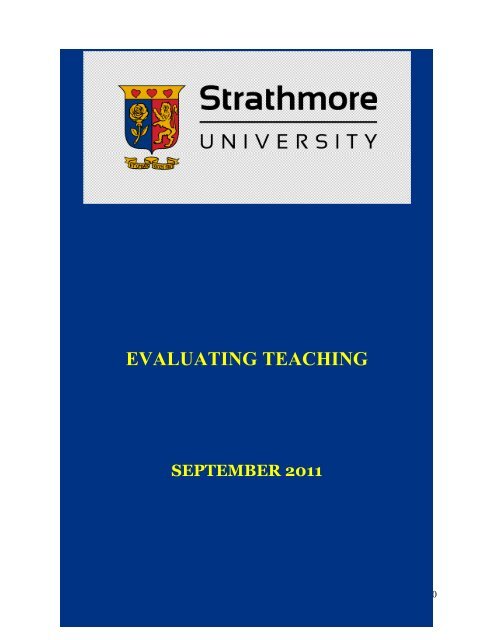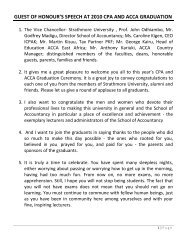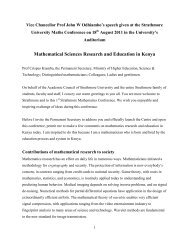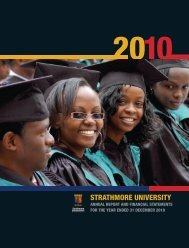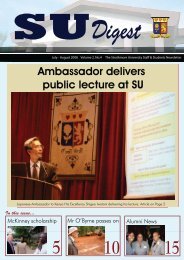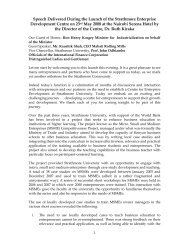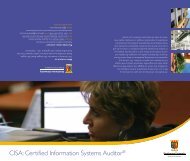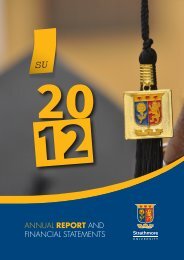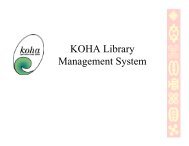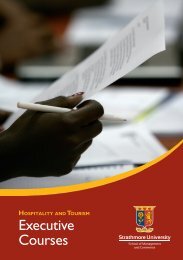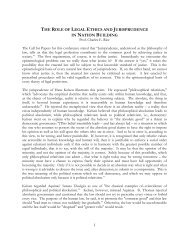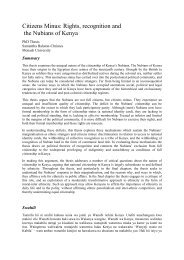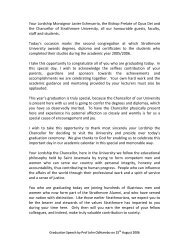EVALUATING TEACHING - Strathmore University
EVALUATING TEACHING - Strathmore University
EVALUATING TEACHING - Strathmore University
- No tags were found...
You also want an ePaper? Increase the reach of your titles
YUMPU automatically turns print PDFs into web optimized ePapers that Google loves.
<strong>EVALUATING</strong> <strong>TEACHING</strong><br />
SEPTEMBER 2011<br />
0
Table of Contents<br />
1. Introduction ................................................................................................................................. 2<br />
2. What is the purpose of the evaluation ....................................................................................... 2<br />
3. What is the focus of the evaluation ........................................................................................... 2<br />
4. Who will be asked to make the evaluation................................................................................ 3<br />
5. Who will see the outcomes of the evaluation; who will act upon them .................................... 4<br />
6. What methods of evaluation are available ................................................................................ 4<br />
7. Course Evaluation Form ............................................................................................................9<br />
8. Lecturers Evaluation Form ......................................................................................................11<br />
1
1. Introduction<br />
Evaluation of teaching involves collecting evidence, from various partners in teaching and<br />
learning, for the purpose of improving the effectiveness of the teaching-learning process. A<br />
successful evaluation generates outcomes that are valid, reliable and indicate directions and<br />
action for improvement.<br />
These guidelines suggest five key questions to be addressed when considering the practical issues<br />
of evaluating teaching.<br />
2. What is the purpose of the evaluation<br />
It could be an evaluation of<br />
• the quality of the educational provision (the product) - which could be the whole<br />
programme, a course (module), a class (lecture, seminar, laboratory, etc)<br />
• the (performance of the providers) - the academic staff, tutors, support staff, involved in<br />
the delivery of this programme/course/class<br />
• the experience of the students as partners in the process - their experience of what is<br />
provided, and of the providers, their motivation and approach to learning<br />
• a combination of these things - provided that the various purposes are made absolutely<br />
clear to those asked to make the evaluation<br />
Good practice: make clear to all those involved the purpose, or purposes, of the evaluation.<br />
3. What is the focus of the evaluation<br />
For example, you might want to know about<br />
• the clarity of the stated educational aims and learning outcomes<br />
• the realism of stated pre-requisites/prior knowledge<br />
• curriculum and content - perceptions of relevance/usefulness<br />
• the way in which the curriculum was presented or delivered<br />
• the development of subject-specific skills<br />
• the development of specific personal and/or transferable skills<br />
2
• the appropriateness of the methods of assessment<br />
• the appropriateness of the style of teaching, and the performance of lecturer<br />
• the quality of feedback to the student on the performance of the student<br />
• the motivation/attitudes of the student<br />
• the educational challenge presented to the students<br />
• the workload, how reasonable, how realistic<br />
• the support available to students/course books/resources for independent learning<br />
• the effort made by the student, and the take-up of support/guidance<br />
• the overall experience of the student of the teaching and support for learning<br />
Good practice: make clear to all those involved the focus of an evaluation - if there are multiple<br />
foci organize the questions into clusters, identifying the focus of each cluster - help the evaluator<br />
to concentrate and make a reflective response<br />
4. Who will be asked to make the evaluation<br />
An evaluation of teaching will normally be designed for students as the primary evaluators, but<br />
there is advantage in also seeking evaluation by all the partners in the process. The responses of<br />
the different participants in the process - students and staff - permit a correlation that adds greatly<br />
to the reliability and validity of the outcomes of the evaluation. Such correlation provides insight<br />
into the level of harmony, or disharmony, of perceptions between the partners in the teachinglearning<br />
process. Internal and/or external academic peers can also be invited to participate in the<br />
evaluation, to introduce a wider perspective on, for example, the academic standards of the<br />
educational provision.<br />
Good practice: correlate outcomes of evaluation from different viewpoints wherever possible.<br />
3
5. Who will see the outcomes of the evaluation; who will act upon them<br />
Before designing an evaluation it is necessary to define<br />
• how, and by whom, the raw data will be processed to generate outcomes<br />
• to whom the outcomes will be reported, and in what detail<br />
• who bears responsibility for taking action in the light of the outcomes<br />
The evaluators, and the evaluated, must have access to the outcomes of the evaluation. So too<br />
must the person(s) responsible for the management of the quality of the educational provision,<br />
such as Dean of School, programme leader (or equivalent) or chair of a school teaching and<br />
learning committee. However, not all of these need have access to the same level of detail.<br />
Good practice: make clear, from the outset, to all involved in the evaluation process who will<br />
have sight of the outcomes, and who will be responsible for taking action, and monitoring the<br />
effectiveness of action. (Note: there is little point, and potential harm, in seeking evaluation of<br />
matters where there is no realistic prospect of any action following the outcomes of evaluation.)<br />
6. What methods of evaluation are available<br />
Only when the purpose of evaluation, its focus, reporting and responsibility for action have been<br />
determined can the method of evaluation properly be addressed. There is always advantage to be<br />
gained by using several methods of evaluation and correlating their outcomes.<br />
a). Questionnaire<br />
This familiar method of seeking feedback from students has the potential advantage of speed (in<br />
administration) and standardisation (for purposes of comparison between cohorts). It can suffer<br />
from poor response rate and validity of outcomes if not designed with care (for purpose and<br />
focus), and if over-applied (the effect of "questionnaire-fatigue").<br />
b). Structured group interview (nominal group technique)<br />
This is a meeting with students at which they are asked to give their views about a programme,<br />
course or class. It must be structured with care to generate constructive debate, and so that<br />
4
students feel free to express their views without personal risk. Typically, students are asked to<br />
work in small groups to reflect upon good and bad features of the educational provision (eg.<br />
programme, course or module), its delivery, and their own performance and experience. A<br />
spokesperson from each group is asked to relay the considered views of the group to the meeting.<br />
The role of the member of staff leading the meeting is to compile a summary of such views, to<br />
validate them at the meeting, and, later, to produce a short report of the main outcomes.<br />
It is good practice for a group interview to be led by an experienced leader who is not involved<br />
in the delivery of the educational provision that is being evaluated, and preferable not in the<br />
same department.<br />
c). Student Module Leaders<br />
For continual improvement during the semester each lecturer will ensure there is a class module<br />
leader whose sole responsibility will be to provide the class feedback about the course to the<br />
lecturer. No report from the module leader should be handled by the faculty/school. See the<br />
attached duties of module leaders, class representatives and student council academic<br />
representative.<br />
This program is intended to improve the teaching and learning process, so as to ensure that both<br />
the students and the lecturer benefit fully. It is a feed forward process instead of the traditional<br />
evaluation at the end of the semester which is feedback.<br />
Each lecturer will have a module leader elected by the class and the lecturer in the first week of<br />
the semester. The module leader and the lecturer will meet on a fortnight basis to discuss the<br />
teaching and learning process. The students’ feedback will be constructive with a sole aim of<br />
improvement.<br />
The Module Leaders<br />
• Will act as a link between the students and lecturers.<br />
• Will be elected by the students of their class ( The lecturer teaching the course should<br />
ensure this is done)<br />
• Will represent one unit each (a unit being subjects/courses offered in a faculty).<br />
5
The feedback will cover:<br />
• The learning environment: physical virtual and psychological<br />
• Challenges the students are facing in learning the unit<br />
• Library provisions (Adequacy, relevance etc)<br />
• Student learning experience<br />
• Recommendations on the way forward.<br />
Class representatives<br />
The class representatives are in charge of issues affecting the learning of the whole group, not<br />
just one module. The class representative will be a member of the school/faculty’s teaching and<br />
learning committee (See guide to quality teaching and learning).<br />
The class representatives will get general feedback on the subjects from the seven/five/three<br />
module leaders, which can be discussed at faculty/schools’ T&L committees or with the subject<br />
leader (lecturer in charge of the subject).<br />
Student council academic representatives<br />
They will be members of the university’s Teaching and Learning, committee (ADU). Any<br />
academic related issues affecting the whole university from the class representatives can be<br />
discussed at ADU meetings.<br />
d). Self-evaluation and peer evaluation<br />
A simple but effective form of self-evaluation by a course/module team is for them to undertake<br />
the same form of evaluation undertaken by the students, i.e. to complete the same questionnaire,<br />
or to conduct a self-evaluation using the same format of a structured group interview. The degree<br />
of harmony between the staff responses and the outcomes of the students' evaluation is a good<br />
indicator of staff awareness of student perceptions. Items of disharmony suggest that staff<br />
understanding of students' needs and concerns needs to be addressed before attending to issues of<br />
detail that arise from the evaluation.<br />
6
Peer evaluation, by external examiners, to support self-evaluation of teaching in relation to the<br />
maintenance of academic standards is a familiar and routine activity. Less familiar, but equally<br />
valuable, is regular peer evaluation of the teaching/learning process.<br />
A colleague, focusing on the process that is taking place, adds a dimension of evaluation that<br />
may escape the member of staff and the students, who are generally too busy with the business of<br />
teaching and learning to observe the process itself. However, casual `dropping-in' on a class is<br />
not the best approach to peer evaluation.<br />
The <strong>University</strong>'s Learning and Teaching Committee is interested in seeing that a peer review<br />
scheme is sufficiently developmental to assist both the individual member of staff and the School<br />
at large, and wishes to emphasize that class observation is only part of a wider process of staff<br />
and educational development. A scheme should aim to encourage staff to continue to reflect on<br />
their teaching - style, content, learning outcomes, use of resources, etc - and the reaction of their<br />
students, both in class and through subsequent coursework and assessments. It is also hoped that<br />
the peer review process of sharing information on good practice in teaching, and on the<br />
enhancement of practice, will make a valuable input to a School's strategy for maintaining high<br />
quality learning opportunities for its students.<br />
Schools should ensure that their peer review schemes involve teaching staff being subject to at<br />
least one class observation a year, more where circumstances suggest that a teacher's<br />
development will benefit from a greater sharing of experience and advice. Particular attention<br />
should be given to the needs of staff new to teaching and of those where student feedback<br />
and/or class observation suggest enhancement would benefit the students' learning experience.<br />
Schools should establish at the start of each session a clear schedule for the completion of<br />
class observations and a list of observers and those whom they have been allocated to observe.<br />
Note that it is not normally good practice for staff to observe each other reciprocally.<br />
It is good practice for peer evaluation to be a planned and structured process, involving the<br />
separate stages of<br />
• briefing, to set context and identify aims and learning outcomes of the process that is to<br />
be observed<br />
7
• observation, with a checklist of key features to look for, agreed at the briefing<br />
• de-briefing, to give feedback on the observation and to compare the perceptions of the<br />
observer and the observed<br />
Again, both self-evaluation and peer evaluation provide correlation with, and add value to, other<br />
forms of evaluation of teaching.<br />
8
COURSE EVALUATION FORM (STUDENT)<br />
Name:____________________________________________________________<br />
RegistratioNo: ___________________________________________________<br />
Course Code and Name: _____________________________________________<br />
Date: ____________________________________________________________<br />
Faculty: _________________________________________________________<br />
Year/Group: _____________________________________________________<br />
The following statements concern your participation in the class and the course itself. Tick () the<br />
response that most closely reflects the extent to which you agree with each statement. Strongly<br />
disagree = 0 while Strongly agree = 4. Your responses will be used for improvement purposes.<br />
Thank you.<br />
Strongly disagree<br />
Disagree<br />
Neutral<br />
Agree<br />
Strongly agree<br />
Concerning the Course Itself<br />
Concerning You<br />
1. The readings for this course were relevant to the subject. <br />
2. The course material was presented in a clear and logical manner. <br />
3. Current trends in the field were discussed. <br />
4. The stated course objectives/learning outcomes in the course outline were met. <br />
5. The course was very practical. <br />
6. The environment was conducive for learning. <br />
7. The course material/syllabus was adequately covered. <br />
8. The course provided the following skills; <br />
• Critical/creative thinking skill.<br />
<br />
• Problem solving skills.<br />
<br />
• Effective oral and written communication.<br />
<br />
• Logical reasoning.<br />
<br />
• Ability to relate theory to practice.<br />
<br />
• Aptitude for life long learning.<br />
<br />
9. The course assignments were related to the course outcomes. <br />
10. The feedback during the course was constructive and helpful. <br />
11. The assessment processes for this course were fair. <br />
12. I believe this course will help me in the future. <br />
13. Overall, I rate this course as excellent <br />
14. I have read the recommended text book. <br />
15. I sought help when I needed it. <br />
16. I have enjoyed this course. <br />
17. I actively participated in this class. <br />
18. I have taken this course evaluation seriously. <br />
DAA-08-01-03/10 a<br />
9
Directions for items 29 – 38: Please take time to answer the following questions as fully as you can.<br />
19. What topics would you recommend to be expanded/improved upon/included in/ excluded from the course<br />
________________________________________________________________________________________________________________<br />
________________________________________________________________________________________________________________<br />
________________________________________________________________________________________________________________<br />
20. How would you describe your own performance in this unit Explain<br />
_______________________________________________________________________________________________________________<br />
_______________________________________________________________________________________________________________<br />
_______________________________________________________________________________________________________________<br />
___<br />
21. What teaching methods applied in the course did you enjoy/learn from most List a few of them.<br />
________________________________________________________________________________________________________________<br />
________________________________________________________________________________________________________________<br />
________________________________________________________________________________________________________________<br />
________________________________________________________________________________________________________________<br />
22. Did this unit have recommended books Yes No.<br />
23.<br />
If Yes, comment about the suitability of the book, availability, its ease of use, and the extent to which you found it helped you learn.<br />
_______________________________________________________________________________________________________________<br />
_______________________________________________________________________________________________________________<br />
_______________________________________________________________________________________________________________<br />
_______________________________________________________________________________________________________________<br />
____<br />
If No, do you feel that the course should have had one Why or why not<br />
_______________________________________________________________________________________________________________<br />
_______________________________________________________________________________________________________________<br />
_______________________________________________________________________________________________________________<br />
_______________________________________________________________________________________________________________<br />
____<br />
24. Please be free to make any other comments, suggestions, or recommendations about this course.<br />
_______________________________________________________________________________________________________________<br />
_______________________________________________________________________________________________________________<br />
___________________________________________________________________________________________________<br />
_________________________________________________________________________________________<br />
_________________________________________________________________________________________<br />
_________________________________________________________________________________________<br />
_________________________________________________________________________________________<br />
_________________________________________________________________________________________<br />
_________________________________________________________________________________________<br />
_________________________________________________________________________________________<br />
_________________________________________________________________________________________<br />
__<br />
DAA-08-01-03/10 a<br />
10
LECTURER’S EVALUATION FORM<br />
Course Code and Name: _____________________________________ Date ______________________<br />
The following statements concern your teaching in the class and the course itself. Tick () the<br />
response that most closely reflects the extent to which you agree with each statement. Strongly disagree<br />
= 0 while Strongly agree = 4. Your responses will be used for improvement purposes. Thank you.<br />
Strongly disagree<br />
Disagree<br />
Neutral<br />
Agree<br />
Strongly agree<br />
1. The books in the library were adequate, up to date and relevant <br />
Concerning the Course Itself<br />
2. The course learning outcomes mainly addressed high cognitive skills/ higher order<br />
learning processes.<br />
<br />
3. The topics in the course outline/plan were sequentially taught. <br />
4. The teaching of the course was research-led. <br />
5. Assessment/feedback to and from student informed changes made on the course. <br />
6. The course practicability was reinforced by a facilitator from the industry. <br />
7. Availability of AVs, size of the class, interactive lectures and students’ shared<br />
experiences enhanced the teaching of the course.<br />
<br />
8. Feedback to the students was timely both generic and specific. <br />
9. The assignments, CATs and examinations tested the learning outcomes. <br />
10. CATs and Exams covered at least 80% of the topics and mainly tested high cognitive<br />
skills.<br />
<br />
11. In the course the students were encouraged; <br />
• To maintain a reflective journal.<br />
• To question, speculate and generate solutions.<br />
• To think of real life examples of what they learnt.<br />
• To analyze material from different sources.<br />
• To present their own arguments clearly.<br />
<br />
<br />
<br />
<br />
<br />
• To develop knowledge, skills and attitudes which can help them improve<br />
occupational academic or personal development.<br />
• To carry out small-scale research.<br />
<br />
<br />
12. The course enabled me to reflect on my teaching. <br />
13. The teaching process was informed by both implicit and explicit theories of teaching. <br />
Concerning You<br />
14. I have read the core text book and referred to some of the recommended books and other<br />
links.<br />
<br />
15. I was observed and I observed someone’s teaching. <br />
16. I have enjoyed teaching this course. <br />
17. The students actively participated in this class. <br />
18. I incorporated the peer review and student’s feedback in my teaching. <br />
DAA-08-01-03/10 b<br />
11
Directions for items 19 – 23: Please take time to answer the following questions as fully as you can.<br />
19. What topics would you recommend to be expanded/improved upon/included in/ excluded from the course<br />
_____________________________________________________________________________________________________________________<br />
_____________________________________________________________________________________________________________________<br />
_____________________________________________________________________________________________________________<br />
20. What other units should have been taught before this unit is taught<br />
_______________________________________________________________________________________________________________<br />
_______________________________________________________________________________________________________________<br />
_______________________________________________________________________________________________________________<br />
21. How would you describe your own performance in this unit<br />
_______________________________________________________________________________________________________________<br />
_______________________________________________________________________________________________________________<br />
_______________________________________________________________________________________________________________<br />
___<br />
22. What teaching methods applied in the course did your students enjoy/learn from most<br />
________________________________________________________________________________________________________________<br />
________________________________________________________________________________________________________________<br />
________________________________________________________________________________________________________________<br />
________________________________________________________________________________________________________________<br />
23. Did this unit have core and recommended books Yes No.<br />
If Yes, comment about the suitability of the book, availability, its ease of use, and the extent to which you found it helped you learn.<br />
_______________________________________________________________________________________________________________<br />
_______________________________________________________________________________________________________________<br />
_______________________________________________________________________________________________________________<br />
_______________________________________________________________________________________________________________<br />
____<br />
If No, do you feel that the course should have had one Why or why not<br />
_______________________________________________________________________________________________________________<br />
_______________________________________________________________________________________________________________<br />
_______________________________________________________________________________________________________________<br />
_______________________________________________________________________________________________________________<br />
24. Please be free to make any other comments, suggestions, or recommendations about this course.<br />
_______________________________________________________________________________________________________________<br />
_______________________________________________________________________________________________________________<br />
___________________________________________________________________________________________________<br />
_________________________________________________________________________________________<br />
_________________________________________________________________________________________<br />
_________________________________________________________________________________________<br />
_________________________________________________________________________________________<br />
25. Any other<br />
______________________________________________________________________________<br />
______________________________________________________________________________<br />
___________________________________________________________________<br />
DAA-08-01-03/10 b<br />
12


